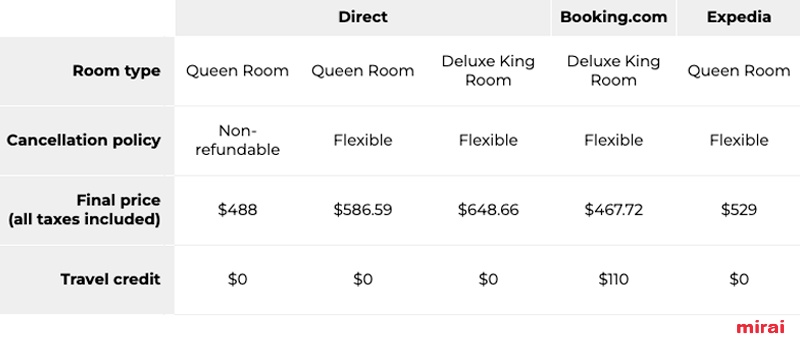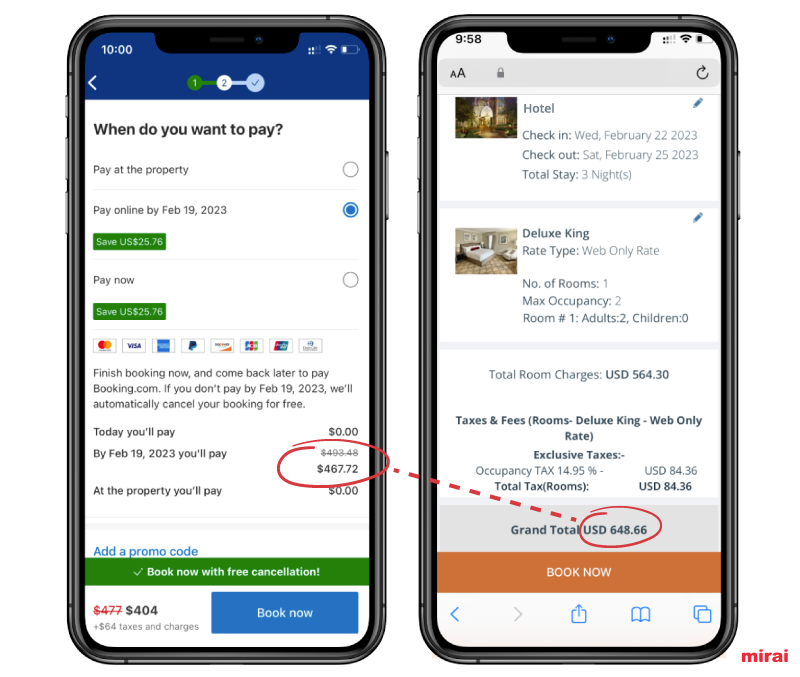In our blog, we try to advise hotels about what they should (or not) do to compete with OTAs.
NB: This is an article from mirai, one of our Expert Partners
Our goal is to challenge hoteliers, providing real data and have them revisit their strategies. Decisions that made sense in the past may not make sense today.
Subscribe to our weekly newsletter and stay up to date
This post will be different. It will not be Mirai speaking, but a regular consumer (myself) explaining why I used an OTA instead of the direct channel to book my last hotel. And to be honest with you, it was a very easy decision. Although I am an advocate of direct sales, as users, we book wherever we find the best deal and wherever it is easier. Before you criticize my decision, put yourself in my shoes and tell me if you wouldn’t have done the same or if you never use OTAs for booking.
What I found was that for the same hotel and dates, Booking.com offered me a better rate, a better room type and a better cancellation policy. The cherry on the cake was a $110 travel credit toward my next reservation (on Booking.com, of course). The best (or maybe worst) part is that I’m pretty sure the hotel is totally unaware of this mess. My question to you is: are you sure it’s not happening to you too?
My trip to Washington D.C.
Like most travelers who are not experts in a city, I started my hotel search on Google, Tripadvisor and, of course, the OTAs (Expedia and Booking.com). This upper funnel is where the OTAs truly add value. After 30 minutes, I had made my decision. A nice independent hotel between the White House and the Capitol.
I then switched to “where-to-book mode” (lower in the funnel) and went to Google Hotels, Trivago and finally checked my Plus account on Tripadvisor, hoping to find a better deal. Given my background, I went to the direct channel to check prices there too. After another 30 minutes, I was done. It really was a no brainer. Booking.com was by far the best option.

As a customer, I am surprised that a travel agency can offer a much more attractive deal than the hotel directly. Why would a hotel pay an agency to sell their best rooms for a lower price? But remember, I’m wearing the customer’s hat so… who cares? What matters to me is what I get. What the hotel gets is not my business.
After a few seconds, I had made my reservation on Booking.com, feeling satisfied with the “great deal I had found”. Thanks Booking.com for your great service. Or should I say, “thanks hotel for rolling out the red carpet to Booking.com so that they can roll it out for me?”

The four decisions the hotel made that created this mess
Hotels regularly receive proposals from OTAs offering “more visibility” in exchange for either an exclusive discount or a higher cost. Nobody does anything for free. And if there is one thing the OTAs have mastered, it is marketing. These new programs look great, full of advantages and with very little to lose. Unfortunately, it’s very much the other way around. OTAs have a lot to gain, and hotels have a lot to lose. But hoteliers, who are always pressed for time and in a constant rush, tend to accept them without thinking twice. And that, I suspect, is what has happened with this hotel.




